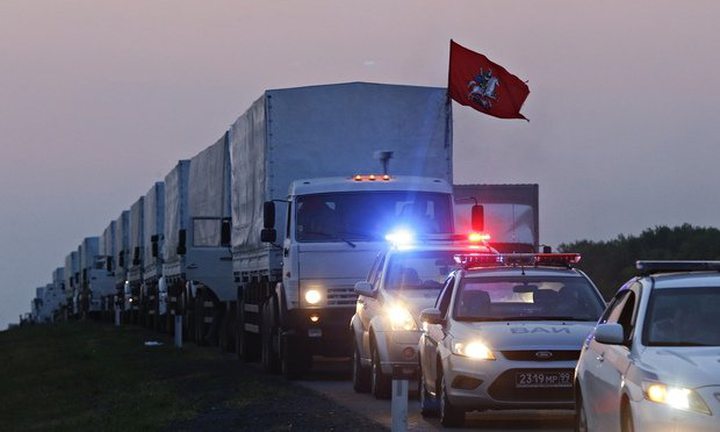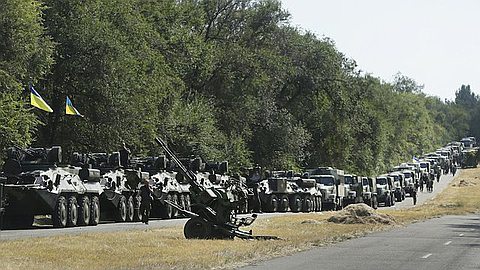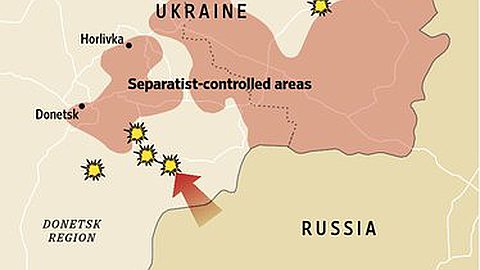Russian Aid Convoy Heads for Ukraine Amid Doubts Over Lorries' Contents

A huge Russian convoy allegedly carrying humanitarian aid was on its way to war-torn eastern Ukraine on Tuesday night, in a operation which the west fears may be a prelude to a Russian invasion but which Moscow insists is designed to relieve the suffering of besieged residents trapped by conflict.
About 280 military lorries hastily repainted white by Russian soldiers trundled off from the Moscow region despite a lack of international agreement over where exactly they were heading or what they contained. Ukraine said it would not allow the convoy to enter its territory. The International Committee of the Red Cross (ICRC) – informed by Moscow last week of a possible shipment – said the mode of transporting the aid safely to those who needed it had yet to be worked out.
The prospect of Russian intervention in eastern Ukraine – the scene of fierce fighting between Ukrainian troops and Russian-backed separatists – has alarmed the US and EU.
On Monday the Nato secretary general, Anders Fogh Rasmussen, said there was a "high probability" of Russian attack which might happen "under the guise of a humanitarian operation".
In recent weeks the pro-Russian rebels have suffered a series of heavy defeats, losing large chunks of territory, with their empire shrivelled to the two major eastern cities of Donetsk and Luhansk. At the same time Ukraine has warned of a major buildup of Russia forces on its border.
The Russian president Vladimir Putin's intentions remained opaque. Russian state television showed footage of men in beige T-shirts and caps loading water and baby food onto the lorries. These reports stated the convoy contained 2,000 tonnes of aid, including grain, sugar, medicine, sleeping bags and power generators.
The Kremlin has said the emergencies ministry was in charge. Putin's spokesman Dmitry Peskov told the Guardian that the convoy would not include any armed personnel.
On Tuesday Russia's foreign minister, Sergei Lavrov, claimed a deal had been agreed with the Ukrainian side which would allow the convoy to drive into Ukraine. Ukrainian officials and representatives from the ICRC and the Organisation for Security and Cooperation in Europe would accompany it, he said. The vehicles would also carry Ukrainian plates. Lavrov claimed an earlier plan to offload the cargo and transport it on Ukrainian lorries had been abandoned on the grounds of cost.
Some believed the convoy was a made-for-TV propaganda stunt to help the largely Russian-speaking population of eastern Ukraine. Others were convinced the slow-moving column was a classic "Trojan horse" intelligence operation to smuggle weapons to rebel militias rapidly running low on fuel and ammunition.
The real test of the convoy's intentions will be revealed in the coming hours. Earlier on Tuesday Russia's foreign ministry said the lorries would make their way to the Shebekino-Pletnevka border crossing, an area controlled by Ukrainian forces just north of Kharkiv, the second city. But a Russian reporter travelling with the convoy tweeted that it was planning to spend the night in Voronezh. The city is on a route that heads directly towards rebel-occupied Luhansk.
The separatists control about 60 miles of the border with Russia, meaning the convoy could enter Ukraine by night without verification by Kiev or the international community.
Andre Loersch, the ICRC's spokesman in Ukraine, told the Guardian that Moscow had yet to give it basic details of what was actually on board the lorries.
He said Lavrov had sent a letter to the organisation's Geneva headquarters last week, raising the idea of a Russian delivery under Red Cross auspices.
Discussions continued with Ukraine's president, Petro Poroshenko, most recently on Monday night. In a conversation with the European commission president, José Manuel Barroso, Poroshenko said he supported the idea of a humanitarian mission, but only if it accorded with international standards and internal rules.
On Tuesday Valery Chaly, a Poroshenko aide, said the convoy's Russian escort and support staff wouldn't be allowed across the border. Chaly stressed: "Everything will be under the control of the Ukrainian side."
Loersch said the ICRC would probably unload the Russian aid at the international border crossing and reload it onto non-Russian lorries.
He expected that Ukrainian customs officials would inspect the cargo. The ICRC would also verify that no arms had been hidden among the shipment in contravention of Red Cross rules.
Loersch added: "We are still waiting for official information [from Moscow] about the content of these trucks." The aid's destination would be Luhansk, he said, where residents have been under bombardment, and without water and electricity for 10 days.
International aid officials admit that Russia's ostensibly humanitarian operation is particularly sensitive given the backdrop of what Ukraine claims is an undercover "hybrid" war waged by Moscow on Ukrainian territory.
On Tuesday the French president, François Hollande, told Putin in a phone call that he had "grave concerns" about Russia's ongoing unilateral mission in Ukraine.
The US secretary of state, John Kerry, said Putin's attendance at the G20 summit in Brisbane in November depended on how he responds to the Ukraine crisis in coming weeks.
Speaking in Australia, Kerry said no decision had yet been taken but added that the US understood Australia's "deep anger and need for justice" over the shooting down last month of Malaysia Airlines flight MH17, in which 298 people were killed including 38 Australians. "This is an unconscionable crime of a huge international order," Kerry declared.
While a full investigation had yet to be completed, Kerry said there was no doubt about the type of weapon used and where it had come from.
"We saw the takeoff, we saw the hit, we saw this airplane disappear from the radar screen, so there is really no mystery," he said. "But we need to have the complete investigation to legitimise whatever steps are going to be taken as we go down the road."
The Russian military has been involved in preparing the convoy, which departed from Alabino, a town outside Moscow where the 2nd Guards Tamanskaya Motor Rifle Division is based. A YouTube video uploaded on 10 August showed soldiers standing next to the convoy and a missile launcher parked across the road. The video later disappeared.
An independent defence analyst, Anton Lavrov, said the video had indeed been taken at the Alabino military base, that some of the vehicles were obviously military lorries repainted white, and identified the launcher as Russia's powerful S-300 surface-to-air missile.
"I think it is a humanitarian PR ploy. If Russia can deliver aid it will raise its prestige, and the residents of eastern Ukraine will know it's Ukraine's fault they weren't getting humanitarian aid," Lavrov said. "If it does try to go through a rebel-controlled border crossing then it will be clear that this is not first and foremost humanitarian aid."
The Russian blogosphere was full of theories that the convoy was meant to provoke an attack so Russian troops could be deployed to protect it, or to begin a regular flow of Russian trucks into eastern Ukraine.
"This specific convoy could be clean. Because for now there's no need to bring weapons in some intricate manner – whole tank columns, Grad rockets, Gvozdika howitzers, Buk missiles are entering Ukraine without difficulty," the popular blogger and commentator Vladimir Golyshev wrote on Facebook.
"But tomorrow problems could arise with this. And for that reason it's important to set a precedent. This is a real diplomatic war."
The Russian nationalist website Sputnik & Pogrom argued that the convoy puts Kiev in a bind: accepting the aid would "completely destroy their narrative of a war with bloodthirsty Russians", but turning it away during a humanitarian crisis would also look bad. "One thing is for sure: the conflict that will develop around the convoy in the next few days will become yet another step toward the deployment of troops to Ukraine and the mobilisation of Russian public opinion for that deployment," the website wrote.
Andrei Illarionov, a former economic policy adviser to Putin who is now a fellow at the conservative Cato Institute in Washington, told the Ukrainian publication Gordon on Monday that any humanitarian convoy to Ukraine would be a sign of Russian aggression aimed at supporting the separatist cause.
"The deployment of a so-called 'humanitarian convoy', 'peace-keeping forces', 'emergencies ministry units' is one of the steps of the methodology developed by the Russian authorities to seize foreign territories," he said.
Illarionov said Russia's emergencies ministry had conducted a similar humanitarian mission to Georgia in 1993. Georgian commentators later accused the operation of delivering arms to separatists in the Abkhazia region, which is now an unrecognised state propped up by Russia.





